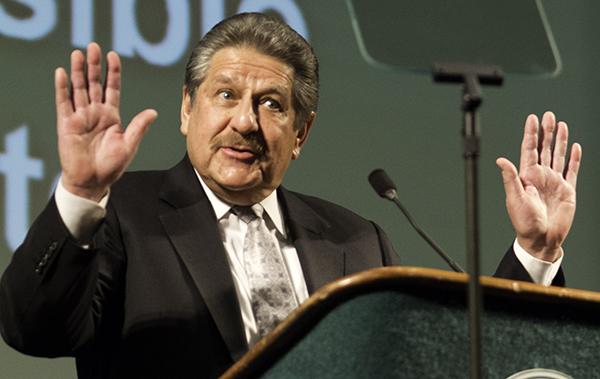Gonzalez’s presidential Spring address proposes change

state hornet 2012
President Alexander Gonzalez gives his spring address at Sacramento State.
January 25, 2012
Sacramento State President Alexander Gonzalez laid out the groundwork for a new initiative that aims to seek creative and efficient ways of doing things under budget constraints during his spring address Thursday.
Gonzalez outlined the basis of the “Redefine the Possible” initiative to a crowd primarily occupied by faculty and staff. Gonzalez introduced the initiative as an aim to promote values of a “21st century university,” and allow for innovation based on mindfulness of the financial resources available to Sac State.
The unveiling of this campus initiative comes two weeks after Gov. Jerry Brown released his 2012-13 budget proposal, which called for no change in this year’s level of state support to the California State University – provided a tax initiative is passed by voters in November. If the tax initiative is not passed, trigger cuts would go into effect and take $200 million out of state support to CSU schools. This would leave state support at $1.8 billion, the lowest level of state funding since 1996-97.
The CSU system already faced a reduction of $100 million in state support due to trigger cuts in December, which forced Sac State to use its reserves to cover. Gonzalez mentioned during his speech that using the reserves is a “one-time option of last resort,” and that “once those funds are gone, they’re gone.”
In an effort to find solutions for the future of a financially-strained campus, the university held forums and focus groups for faculty, student and community input. Recommendations that came out of these forums are what helped build the “Redefine the Possible” initiative.
“It’s definitely important to keep in mind that the initiative is all based on feedback from many faculty and staff, and even students,” said Nick Burnett, associate dean of the College of Arts and Letters. “It’s really going to define how we look at things in higher education … I’ll be interested to see how this rolls out.”
Gonzalez said Sac State would be looking at reworking policies and programs – through the faculty senate – to help streamline the process and serve students best. He said the total number of general education units required to graduate is just one of the requirements that could possibly be updated or replaced.
“Students often think, ‘Why am I taking this class?’ and would prefer to spend that time on their major courses,” Gonzalez said. “Of course, any changes to general education or curriculum would have to go through the (faculty) senate.”
“Redefine the Possible” follows the conclusion of “Destination 2010,” an initiative that focused on programs that increased graduation rates, a modernization of classrooms and the construction of the recreational facility, The Well. While “Destination 2010” had a clear timeline, Gonzalez said the new initiative will likely be ongoing based on the continuous budget cuts.
“I just don’t see the state restoring funds to the CSU anytime soon,” Gonzalez said. “Higher education is changing, and it’s up to us to change with it – or get left behind.”
Gonzalez said in the month ahead he would have other administrators conduct “possibility audits” and report back on specific areas on campus that can be improved on. Once the audits are done, he said it could be possible to complete other goals like constructing a new science building and updating old teaching technologies.
“I’m really inspired by the message,” said David Evans, geology professor and chair. “Sacramento State has a lot of passionate faculty, and if anyone can come up with creative solutions to the problems in higher education – it’s the people here.”
Jason Conwell, regional staff representative for the California Faculty Association, said Gonzalez’s speeches always have a lot of discussion of needing to do things “more efficiently,” and that theme coupled with the speech’s vagueness had him nervous.
“It was short, and filled with a lot of buzz-words,” Conwell said. “I’m not against doing new things, but I want to see what’s actually going to be different first. Overall, it just felt unclear to me.”
Brett Johnson can be reached at [email protected].




























































































































